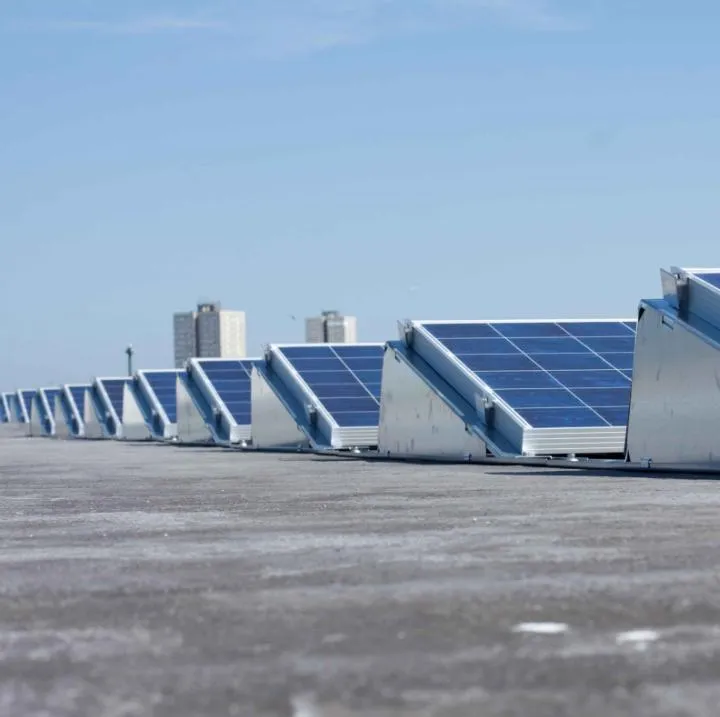PALM HARBOR SOLAR PROS BLOG
Insights from Our Solar Energy Journey

The Future of Clean Energy: Exploring Solar Solutions for Homes and Businesses
As we delve into the future of clean energy, it becomes clear that solar solutions for homes and businesses are on the rise. The potential for harnessing the power of the sun is immense, and the advantages of solar energy are becoming increasingly apparent. But what does this mean for residential buildings and commercial properties? How can innovative technologies help overcome the challenges of solar implementation? And most importantly, what does the future hold for solar energy? In this discussion, we will explore the answers to these questions and shed light on the promising path towards a sustainable and energy-efficient future.
The Rise of Solar Energy
Solar energy has been experiencing a remarkable surge in popularity and adoption as a reliable and sustainable solution for both homes and businesses. This rise can be attributed to several factors, including government incentives and the emergence of community solar projects.
Government incentives play a crucial role in the growth of solar energy. Many countries and states offer tax credits, grants, and rebates to encourage individuals and businesses to invest in solar power systems. These incentives help to offset the upfront costs and make solar energy more affordable and accessible to a wider range of people. By taking advantage of these incentives, homeowners and businesses can not only save money on their energy bills but also contribute to a greener and more sustainable future.
Another driving force behind the rise of solar energy is the emergence of community solar projects. These projects allow multiple individuals or businesses to collectively invest in a solar power system located in a central location, such as a shared rooftop or a solar farm. Participants can then benefit from the generated electricity without the need for installing panels on their own properties. Community solar projects offer a cost-effective and convenient solution for those who may not have suitable roofs or the financial means to invest in their own solar installations.
Advantages of Solar Solutions
With the rise of solar energy and its numerous benefits, it is important to explore the advantages that solar solutions offer to both homes and businesses. One of the major advantages of solar solutions is cost effectiveness. Installing solar panels may require an initial investment, but they can significantly reduce electricity bills in the long run. By generating their own electricity, homes and businesses can save money on energy costs and even sell excess energy back to the grid. Additionally, solar solutions require minimal maintenance, which further reduces expenses.
Another advantage of solar solutions is their environmental sustainability. Solar energy is a renewable source of power, meaning it can be replenished naturally. Unlike fossil fuels, solar energy does not produce harmful emissions or contribute to climate change. By adopting solar solutions, homes and businesses can reduce their carbon footprint and contribute to a cleaner, greener environment.
Furthermore, solar solutions provide energy independence. With solar panels, homes and businesses can generate their own electricity and rely less on traditional power sources. This not only reduces dependence on fossil fuels but also provides a more stable and reliable energy source.
Solar Power for Residential Buildings
We can explore the benefits and applications of solar power in residential buildings. Solar power has become increasingly popular for homeowners looking to reduce their reliance on traditional energy sources and save money on their electricity bills. Installing solar panels on residential buildings allows homeowners to harness the power of the sun and convert it into usable energy. The installation process for solar panels has become more streamlined and affordable in recent years, making it an attractive option for many homeowners.
One of the main advantages of solar power for residential buildings is the potential for significant energy savings. By generating their own electricity through solar panels, homeowners can reduce or even eliminate their monthly electricity bills. This can result in substantial long-term savings, especially as energy costs continue to rise. Additionally, homeowners who produce more electricity than they consume can even sell the excess energy back to the grid, further increasing their savings.
In addition to the cost savings, solar power also offers environmental benefits. Solar energy is a renewable and clean source of power, meaning it produces no harmful emissions or pollution. By utilizing solar power, homeowners can reduce their carbon footprint and contribute to a more sustainable future.
Solar Energy for Commercial Properties
Commercial properties have increasingly turned to solar energy as a cost-effective and environmentally friendly solution for their energy needs. Solar energy for industrial sites and solar power for retail establishments have become popular options in the commercial sector.
Industrial sites, with their large energy demands, can greatly benefit from solar energy. By installing solar panels on rooftops or open spaces, industrial properties can generate their own electricity and reduce their reliance on the grid. This not only helps to cut down on energy costs but also minimizes their carbon footprint. Additionally, solar energy systems can provide a reliable and consistent source of power, ensuring uninterrupted operations for industrial sites.
Retail establishments, such as stores and shopping malls, are also embracing solar energy. With their extensive roof spaces, these properties have the potential to generate a significant amount of electricity through solar panels. By harnessing the power of the sun, retailers can not only reduce their energy bills but also portray a sustainable image, attracting environmentally conscious customers. Moreover, solar energy can provide a reliable backup during power outages, ensuring smooth operations and customer satisfaction.
Innovative Technologies in Solar Solutions
As we explore solar solutions for homes and businesses, it is important to highlight the innovative technologies that are revolutionizing the solar industry. One such technology is smart grid integration, which allows for the seamless integration of solar power into existing power grids. This technology enables homeowners and businesses to not only generate their own clean energy but also to sell any excess energy back to the grid, reducing their reliance on non-renewable energy sources.
Smart grid integration also enables better management of energy consumption, allowing for more efficient use of solar power. Through advanced monitoring and control systems, users can track their energy usage in real-time and make adjustments to optimize their energy efficiency.
Another innovative technology in solar solutions is solar powered transportation. Solar panels can now be integrated into various modes of transportation, including cars, buses, and even bicycles. These solar-powered vehicles are not only environmentally friendly but also offer a sustainable and cost-effective alternative to traditional fossil fuel-powered vehicles.
With the continued advancements in solar technology, we can expect to see even greater integration of solar solutions in our daily lives. These innovative technologies are paving the way towards a cleaner and more sustainable future.
Overcoming Challenges in Solar Implementation
To successfully implement solar solutions, it is crucial to address and overcome various challenges that may arise. One of these challenges is grid integration. While solar energy is a renewable and sustainable source, it is intermittent, meaning it is only available when the sun is shining. This poses a challenge when it comes to integrating solar power into the existing electrical grid. However, advancements in technology have made it possible to overcome this challenge. Smart grid systems, for example, allow for better management and distribution of solar power, ensuring a more reliable and stable energy supply.
Another challenge that needs to be overcome is the lack of government incentives. While solar energy has numerous environmental and economic benefits, the upfront costs can be prohibitive for many individuals and businesses. Government incentives, such as tax credits and subsidies, play a crucial role in making solar energy more affordable and accessible. However, the availability and extent of these incentives vary from country to country and even between states or provinces. To overcome this challenge, it is important for governments to provide consistent and robust incentives to encourage widespread adoption of solar energy.
The Future of Solar Energy
The potential for solar energy to revolutionize our energy landscape is boundless. As we look to the future, two key areas of development hold great promise for maximizing the benefits of solar energy: grid integration and solar energy storage.
Grid integration refers to the process of integrating solar power into the existing electrical grid. This allows for a more efficient distribution of energy and ensures that excess solar power can be supplied to the grid, reducing reliance on traditional energy sources. By seamlessly integrating solar energy into the grid, we can create a more reliable and sustainable energy system.
Another important aspect of the future of solar energy is the development of efficient and cost-effective energy storage solutions. Solar energy storage allows for the capture and storage of excess solar power when it is generated and can be used later when the sun is not shining. This ensures a continuous supply of clean energy, even during periods of low solar generation.
Advancements in grid integration and solar energy storage technologies will play a crucial role in unlocking the full potential of solar energy. By effectively integrating solar power into the grid and optimizing energy storage, we can create a more sustainable and resilient energy system for the future.
Conclusion
In conclusion, solar energy is paving the way for a cleaner and more sustainable future. Its rise in popularity is evident in both residential and commercial settings, offering numerous advantages for homes and businesses alike. With innovative technologies and ongoing efforts to overcome challenges, solar solutions are becoming increasingly accessible and efficient. As we look ahead, it is clear that solar energy will play a crucial role in meeting our energy needs and reducing our carbon footprint.
Connect With Us
Locations We Serve:
© Copyright 2026 Palm Harbor Solar Pros. All Rights Reserved.
Terms & Conditions | Privacy Policy

